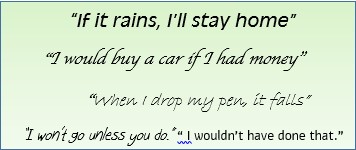We use conditionals to say the result of a condition. There are two parts: the ‘if’ section explains the condition, and the main clause explains the result.
If it rains, I will get wet. – The condition is ‘it rains’ and the result is ‘get wet’.
I will get wet if it rains.
There are many types of conditionals for different situations.
The zero conditional
The zero conditional is used for things that are generally true for a person, or things which are a law or rule.
[Structure: If/When + present simple, present simple. // present simple + if/when + present simple.]
If I study hard, I get a headache. – generally true for me.
When you drop a pen, it falls. – law of physics.
You need a ticket if you want to watch the movie. – rule of the movie theater.
The first conditional
The first conditional is used for future situations which are possible or we expect to be true.
[Structure: If/When + present simple, will + infinitive // will + infinitive + if/when + present simple.]
If I have time tomorrow I will go to the library.
He will be angry if he doesn’t win the game.
I’ll phone you when I get home.
It is also possible to use as long as, as soon as, unless, or in case.
You can stay here as long as you don’t make a mess.
We’ll leave as soon as Tom gets here.
I won’t buy a new shirt unless it is under 10,000yen.
I’ll take an umbrella in case it rains.
Instead of will you can use various other verbs, such as may, might, should etc.
I should leave as Tom gets here.
I might buy it if it is cheap.
You can sit there if no one comes.
The second conditional
The second conditional is used when we imagine present or future situations that are impossible or unlikely to happen.
[Structure: if + past simple, would + infinitive. // would + infinitive + if + past simple.]
If I had more time, I would travel more.
I would go to the party next Friday if I didn’t have to work.
If I were a cat, I would sleep all day!
Note: Grammatically if I were.., if he were.., if she were.. are correct, but was is common in spoken English.
If I were you, I wouldn’t go.
If he were (was) older he would have more experience.
He would move to America if he were (was) richer.
Again, alternatives to if and alternative verbs instead of would are possible.
I could retire in five years if I could save more money.
I wouldn’t marry you unless you were really rich!
The third conditional
The third conditional is used when we imagine a different past. There is an imaginary change in the past situation and an imaginary different result.
[Structure: If + past perfect, would have + past participle. // would have + past participle + if + past perfect.]
If I had studied English harder, I would have gotten a job in an international country.
She wouldn’t have forgotten his birthday if she had written it on her calendar.
We might/could have caught the train if we had run faster!
I wouldn’t have done it unless you had forced me to.
Mixed conditionals
It is also possible to have mixed conditionals. The most common is imagining how a change in a past situation would affect the present. The second type imagines how a change in a present situation would have meant the past was also different.
a. Past/present
[Structure: If + past perfect, would + infinitive. // would + infinitive + if + past perfect.]
If I hadn’t eaten that big cake, I wouldn’t feel sick now. [present result]
Versus: If I hadn’t eaten that big cake, I wouldn’t have felt sick last night. [past result]
I would live in London if I had gotten the job in Harrods.
b. Present/past
[Structure: If + past simple, would have + past participle. // would have + past participle, If + past simple.]
If I were a woman [present imagination], I would have worn a skirt to school.
If would have gone swimming every day if there was a pool in the hotel.
Practice:
ラボール英会話教室.png)

